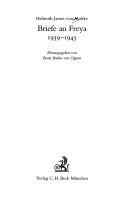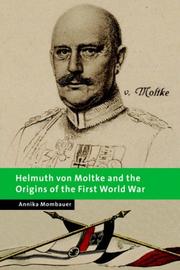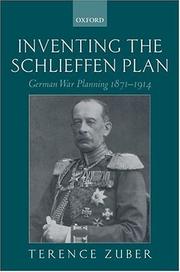| Listing 1 - 9 of 9 |
Sort by
|
Book
ISBN: 9783406613838 Year: 2011 Publisher: München Beck
Abstract | Keywords | Export | Availability | Bookmark
 Loading...
Loading...Choose an application
- Reference Manager
- EndNote
- RefWorks (Direct export to RefWorks)
Anti-Nazi movement --- Women --- Moltke, Freya von. --- Moltke, Helmuth James,

ISBN: 3406330320 Year: 1988 Publisher: München Beck
Abstract | Keywords | Export | Availability | Bookmark
 Loading...
Loading...Choose an application
- Reference Manager
- EndNote
- RefWorks (Direct export to RefWorks)
Moltke, von, Helmuth James --- Anti-Nazi movement --- Nationalists --- World War, 1939-1945 --- ro: hrsg. von --- German resistance movement --- Nationalism --- Correspondence --- Personal narratives, German --- Underground movements --- Moltke, Freya von --- Moltke, Helmuth James, --- Moltke, Helmuth James Wilhelm Ludwig Eugen Heinrich, --- Von Moltke, Freya --- Deichmann, Freya --- Correspondence.

ISBN: 0521019567 9780521019569 9780521791014 9781316257050 9781316348512 1316348512 0521791014 1316345033 1316347389 1316345718 1316346250 1316347974 1316257053 Year: 2001 Volume: *13 Publisher: Cambridge New York Melbourne Cambridge University Press
Abstract | Keywords | Export | Availability | Bookmark
 Loading...
Loading...Choose an application
- Reference Manager
- EndNote
- RefWorks (Direct export to RefWorks)
This book explores the influence of Helmuth von Moltke, Germany's Chief of the General Staff between 1906 and 1914. Based largely on previously unknown primary sources, it analyses the General Staff's role in military decision-making and Moltke's relationship with Kaiser Wilhelm II, as well as the genesis of the Schlieffen Plan and Germany's military and political reactions to the many pre-war crises. Moltke's influence on Germany's political decision-making was decisive, helping to foster an increasingly confrontational mood. The book takes specific issue with the common perception of Moltke as an ineffectual and reluctant military leader, remembered primarily for the defeat at the Battle of the Marne and his alleged adulteration of the Schlieffen Plan. It concludes that he was both bellicose and ambitious, hoping for war 'the sooner the better' and playing a crucial role in the outbreak and early months of the First World War.
World War, 1914-1918 --- Causes --- Moltke, Helmuth von, --- Moltke, Helmuth Johannes Ludwig von, --- Von Moltke, Helmuth, --- Fon Molʹtke, Khelʹmut, --- Molʹtke, Khelʹmut fon, --- Germany --- Politics and government --- Causes. --- Moltke, Helmuth Johannes Ludwig von (1848-1916) --- Guerre mondiale (1914-1918) --- Schlieffen, Alfred von (1833-1913) --- Allemagne --- Biographie --- Aspect stratégique --- Histoire militaire --- 1870-1918
Book
ISBN: 3657784489 Year: 2017 Publisher: Paderborn : Verlag Ferdinand Schöningh,
Abstract | Keywords | Export | Availability | Bookmark
 Loading...
Loading...Choose an application
- Reference Manager
- EndNote
- RefWorks (Direct export to RefWorks)
Hans Adolf von Moltke (1884-1943) war als Vertreter der Weimarer Republik und des »Dritten Reiches« in Polen tätig. Während des Zweiten Weltkrieges beteiligte er sich am NS-Aktenraub im besetzten Europa und wurde 1943 Botschafter in Madrid. Hans Adolf von Moltke gehörte zu einer Familie, die einen namhaften Platz in der deutschen Geschichte innehatte: Zu seinen Vettern gehörten der Generalfeldmarschall Helmuth Carl Bernhard von Moltke und der Widerständler Helmuth James von Moltke. Bernard Wiaderny rekonstruiert die Persönlichkeit des Diplomaten Hans Adolf von Moltke, seine weltanschaulichen Ansichten und seine politische Verortung vor dem Hintergrund der prägenden Tendenzen seiner Zeit in Deutschland. Der Autor schildert, welche Ziele Moltke während seiner Tätigkeit als Vertreter Deutschlands in Polen verfolgte, welche Rolle er beim NS-Aktenraub spielte, was er während seiner Zeit als Botschafter in Madrid 1943 unternahm und was er über den Widerstand gegen das NS-Regime wusste. Für die Studie wurde ein umfassender Fundus an Quellen in Archiven in Deutschland, Polen, Großbritannien und den USA ausgewertet.
Diplomats --- Moltke, Hans Adolf von, --- Germany --- Poland --- Foreign relations --- Politics and government
Book
ISBN: 3886801543 Year: 1986 Publisher: Berlin Siedler
Abstract | Keywords | Export | Availability | Bookmark
 Loading...
Loading...Choose an application
- Reference Manager
- EndNote
- RefWorks (Direct export to RefWorks)
Anti-Nazi movement --- History --- Sources --- Moltke, Helmuth James, --- Archives --- Kreisauer Kreis --- Lawyers --- War (International law) --- Avocats --- Guerre (Droit international) --- Antinazisme --- Biography --- Biographies --- Hostilities --- International law --- Neutrality --- German resistance movement --- World War, 1939-1945 --- Underground movements --- Moltke, Helmuth James Wilhelm Ludwig Eugen Heinrich,

ISBN: 0199250162 9780199250165 0198718055 0191581836 1299821650 0191719552 Year: 2002 Publisher: Oxford ; New York Oxford University Press
Abstract | Keywords | Export | Availability | Bookmark
 Loading...
Loading...Choose an application
- Reference Manager
- EndNote
- RefWorks (Direct export to RefWorks)
The existence of the Schlieffen Plan has been one of the basic assumptions of 20th-century military history. Terence Zuber challenges this assumption and presents a different picture of German war planning between 1871 and 1914. He concludes that there never really was a Schlieffen Plan.
Strategie --- Strategy --- Stratégie --- Military planning --- -Strategy --- World War, 1914-1918 --- -European War, 1914-1918 --- First World War, 1914-1918 --- Great War, 1914-1918 --- World War 1, 1914-1918 --- World War I, 1914-1918 --- World War One, 1914-1918 --- WW I (World War, 1914-1918) --- WWI (World War, 1914-1918) --- History, Modern --- Military strategy --- Military art and science --- Military doctrine --- War planning --- Military administration --- Military policy --- Planning --- History --- -Causes --- Schlieffen, Alfred Graf von --- Germany --- History, Military. --- -History --- Causes --- Schlieffen, Alfred, --- Fon-Shliffen, A., --- Von Schlieffen, Alfred, --- Schlieffen, Alfred --- 20th century --- History [Military ] --- Strategy. --- Causes. --- Schlieffen, Alfred von (1833-1913) --- Moltke, Helmuth von (1800-1891) --- Allemagne --- Critique et interprétation --- Politique militaire --- 1871-1914
Book
ISBN: 350675629X 9783506756299 Year: 2007 Volume: 2 Publisher: Paderborn [etc.] Ferdinand Schöningh
Abstract | Keywords | Export | Availability | Bookmark
 Loading...
Loading...Choose an application
- Reference Manager
- EndNote
- RefWorks (Direct export to RefWorks)
Military planning --- Schlieffen Plan --- Strategy --- World War, 1914-1918 --- European War, 1914-1918 --- First World War, 1914-1918 --- Great War, 1914-1918 --- World War 1, 1914-1918 --- World War I, 1914-1918 --- World War One, 1914-1918 --- WW I (World War, 1914-1918) --- WWI (World War, 1914-1918) --- History, Modern --- Military strategy --- Military art and science --- Military doctrine --- War planning --- Military administration --- Military policy --- Planning --- Schlieffen, Alfred, --- Fon-Shliffen, A., --- Von Schlieffen, Alfred, --- Germany --- History, Military --- Schlieffen, Alfred von (1833-1913) --- Moltke, Helmuth Johannes Ludwig von (1848-1916) --- Guerre mondiale (1914-1918) --- Critique et interprétation --- Aspect stratégique

ISBN: 0333716949 0333693361 0333687574 0333691458 033369144X 9780333684580 0333684583 0333684591 9780333684597 0333534905 Year: 2006 Publisher: Houndmills ; New York Palgrave Macmillan
Abstract | Keywords | Export | Availability | Bookmark
 Loading...
Loading...Choose an application
- Reference Manager
- EndNote
- RefWorks (Direct export to RefWorks)
Communism has had a profound impact on Europe from the mid-nineteenth century to the present. In theory, it promised equality and freedom for all. In practice, it spawned inegalitarian, authoritarian and, in some instances, monstrous regimes in East Europe. Ronald Kowalski re-examines the history of European Communism, from its theoretical origins in the work of Marx and Engels until the collapse of the Soviet Union, and explains why it failed to come to power in West Europe.
History of the United Kingdom and Ireland --- anno 1600-1699 --- anno 1400-1499 --- anno 1500-1599 --- Philip II [King of Spain] --- 27 <420> "10/14" --- Histoire de l'Eglise--Engeland--?"10/14" --- Christian sociology --- Christian social theory --- Social theory, Christian --- Sociology, Christian --- Sociology --- History --- England --- Church history --- Christian church history --- anno 1900-1909 --- anno 1910-1919 --- anno 1800-1899 --- Communism --- Bolshevism --- Communist movements --- Leninism --- Maoism --- Marxism --- Trotskyism --- Collectivism --- Totalitarianism --- Post-communism --- Socialism --- Village communities --- Sociologie religieuse --- Christianisme --- Histoire --- Angleterre --- Histoire religieuse --- Moltke, Helmuth von (1800-1891) --- Politique militaire --- Guerre franco-allemande (1870-1871) --- Critique et interprétation --- Allemagne --- 1864-1871 --- Aspect stratégique
Book
ISBN: 3528086491 9783528086497 Year: 1977 Publisher: Braunschweig Vieweg
Abstract | Keywords | Export | Availability | Bookmark
 Loading...
Loading...Choose an application
- Reference Manager
- EndNote
- RefWorks (Direct export to RefWorks)
72.01 --- 711.4 --- Fritz Schumacher --- architectuur --- architectuurgeschiedenis --- architectuurtheorie --- Vitruvius --- Flavius Josephus --- lukianos --- Alberti leon Battista --- Vasari Giorgio --- Dürer Albrecht --- Rabelais François --- Fischart Johann --- Furtenbach Joseph --- Goethe Johann Wolfgang --- Sulzer Johann Georg --- Wackenroder Wilhelm Heinrich --- Solger K.W.F. --- Schopenhauer Arthur --- Schinkel Karl Friedrich --- Lotze Hermann --- Semper Gottfried --- Ruskin John --- burckhardt Jakob --- Gregorovius Ferdinand --- Dehio Georg --- Grimm Herman --- Justi CArl --- Freytag Gustav --- Giedion Sigfried --- Fontane Theodor --- Pückler-Muskau Hermann --- von Moltke Helmuth --- Lichtwark Alfred --- Rodin Auguste --- Wagner Richard --- Appel Paul --- Allmers Hermann --- Keyserling Hermann --- Wölfflin Heinrich --- Scheffler Karl --- Sörgel Herman --- Runge Philipp Otto --- Mössel Ernst --- Schumacher Fritz --- Valéry PAul --- Riehl Wilhelm Heinrich --- Huber Victor Aimé --- Taine Hippolyte --- Howard Ebenezer --- Unwin Raymond --- Sitte Camillo --- Gurlitt Cornelius --- Fischer Theodor --- Le Corbusier --- Wagner Otto --- Poelzig HAns --- Muthesius Hermann --- Behrens Peter --- Tessenow Heinrich --- Eberstadt Rudolf --- Bonatz paul --- Hamann Richard --- lalitavistara --- Boeddhisme --- 1001 nachten --- Hölderlin Friedrich --- Lord Byron --- Lessing Gotthold Ephraim --- Schiller Friedrich --- Paul Jean --- Hoffmann E.T.A. --- de Balzac Honoré --- Raabe Wilhelm --- Reuter Fritz --- Keller Gottfried --- Meyer Conrad Ferdinand --- Stifter Adalbert --- Rilke Rainer MAria --- Morgenstern Christian --- 72.03 --- Architectuurtheorie. Bouwprincipes. Esthetica van de bouwkunst. Filosofie van de bouwkunst --- Architectuur (theorie) --- Architectuurtheorie --- Stedenbouw (theorie) --- Architecture. --- Architects --- City planning. --- Architects. --- 72.01 Architectuurtheorie. Bouwprincipes. Esthetica van de bouwkunst. Filosofie van de bouwkunst --- Solger K.W.F --- Hoffmann E.T.A --- 72.01 Theory and philosophy of architecture. Principles of design, proportion, optical effect --- Theory and philosophy of architecture. Principles of design, proportion, optical effect
| Listing 1 - 9 of 9 |
Sort by
|

 Search
Search Feedback
Feedback About UniCat
About UniCat  Help
Help News
News